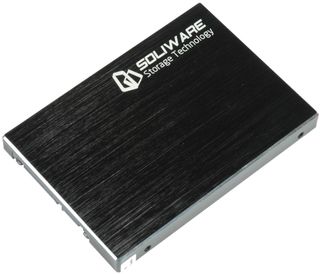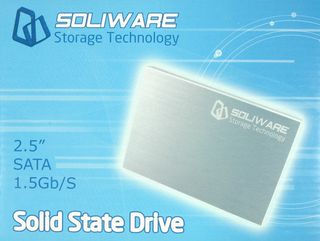Six New SSDs: Can Intel Be Dethroned?
Soliware SSD S100 32 GB

Another drive, another chance. Silicon Power provides good application benchmark results and low power consumption, but insufficient write performance. The other candidates by Memory Corp and Chaintech are even worse at writing, and horrible when it comes to I/Os per second. Soliware, a Chinese flash SSD maker, whose Web site cannot be found if you Google “soliware”, (even though its site is soliware.com) provided a 32 GB flash SSD called the S100 SSD, which the vendor calls the “super value” series based on MLC flash memory. There is a P100 as well, which would be the SLC model.
Flash SSDs With Cache Memory

Soliware is different from other vendors in that it says that it uses an additional 128 MB cache memory on its drives, which are available in sizes of 32, 64 or 128 GB. The data sheet states read and write throughput of 110 MB/s despite multi-level cell flash memory. The rated power consumption of 1 W in idle and 3 W active power seems realistic as well.
We checked the facts. First we looked at the access times and were a bit disappointed: an access time of 1 ms is ten times longer than the 0.1 ms found with other SSDs. Then we found a 125 MB/s maximum interface throughput—not much, but it may suffice. The drive managed to sustain a constant 103 MB/s read throughput, which is 50% faster than the throughput of conventional hard drives.
Surprising Performance Results
Now comes the surprise: This drive reached the same 103 MB/s throughput on writes—and more. We measured a 122.4 MB/s maximum on our test system, which certainly is the result of the integrated cache memory. Then we looked at I/O performance and were surprised again. Although the drive isn’t really fast in any of the I/O benchmarks, it still outperforms its competitors in this roundup. It is many times faster than the other drives, and positions itself in the middle of the I/O performance charts.
And Surprising Power Consumption
Stay on the Cutting Edge
Join the experts who read Tom's Hardware for the inside track on enthusiast PC tech news — and have for over 25 years. We'll send breaking news and in-depth reviews of CPUs, GPUs, AI, maker hardware and more straight to your inbox.
This was yet another surprise: The Soliware SSD S100 flash drive is the most power hungry flash-based drive we’ve had in our test lab. While the 1.9 W idle power is almost twice as much as the vendor specifies, the real surprise is peak power of 4.0 W. This is more than any modern conventional 2.5” hard drive requires. However, the power requirement during DVD playback was not that bad, at 1.9 W. Two drives, the SSDs by Crucial and Mtron, required even more power to provide a DVD bit stream.


Current page: Soliware SSD S100 32 GB
Prev Page Silicon Power 64 GB SLC Next Page Super Talent SATA 2.5” SSD, MasterDrive OXMost Popular

